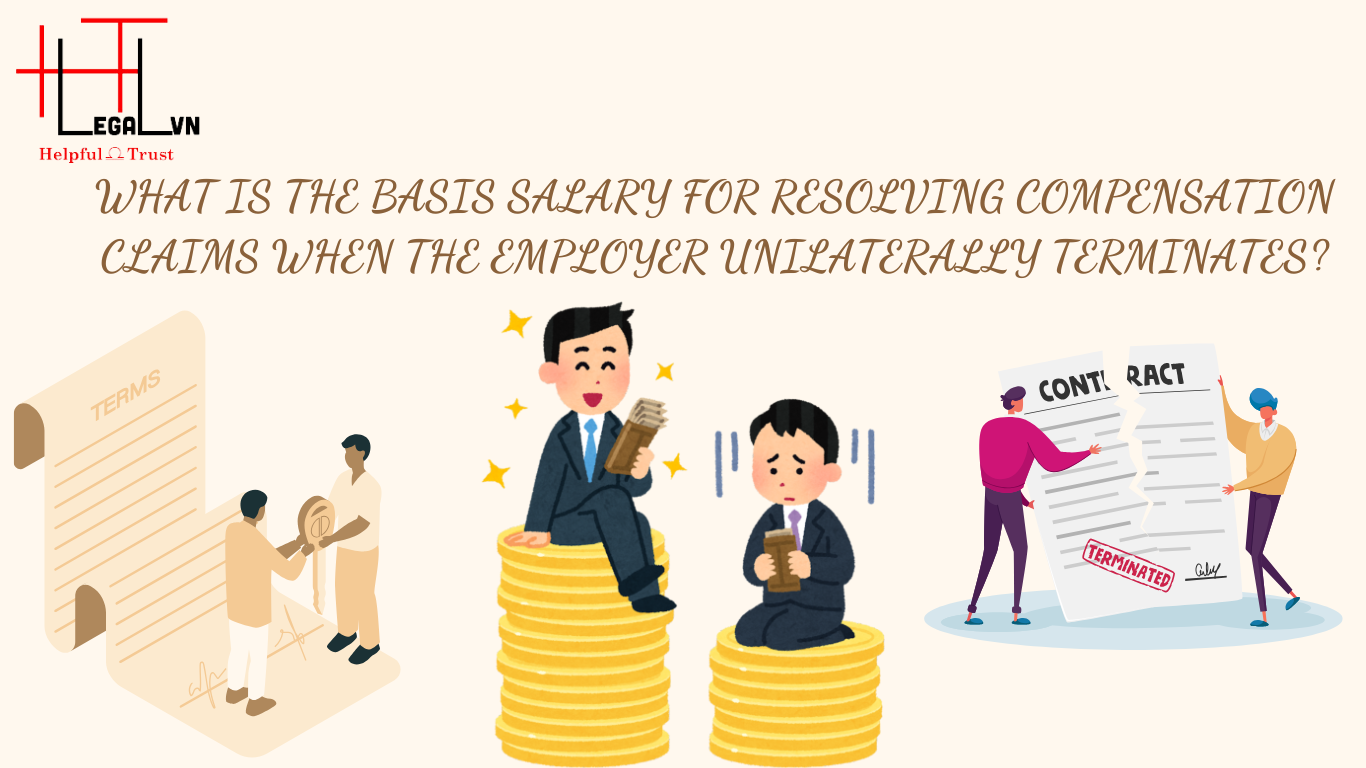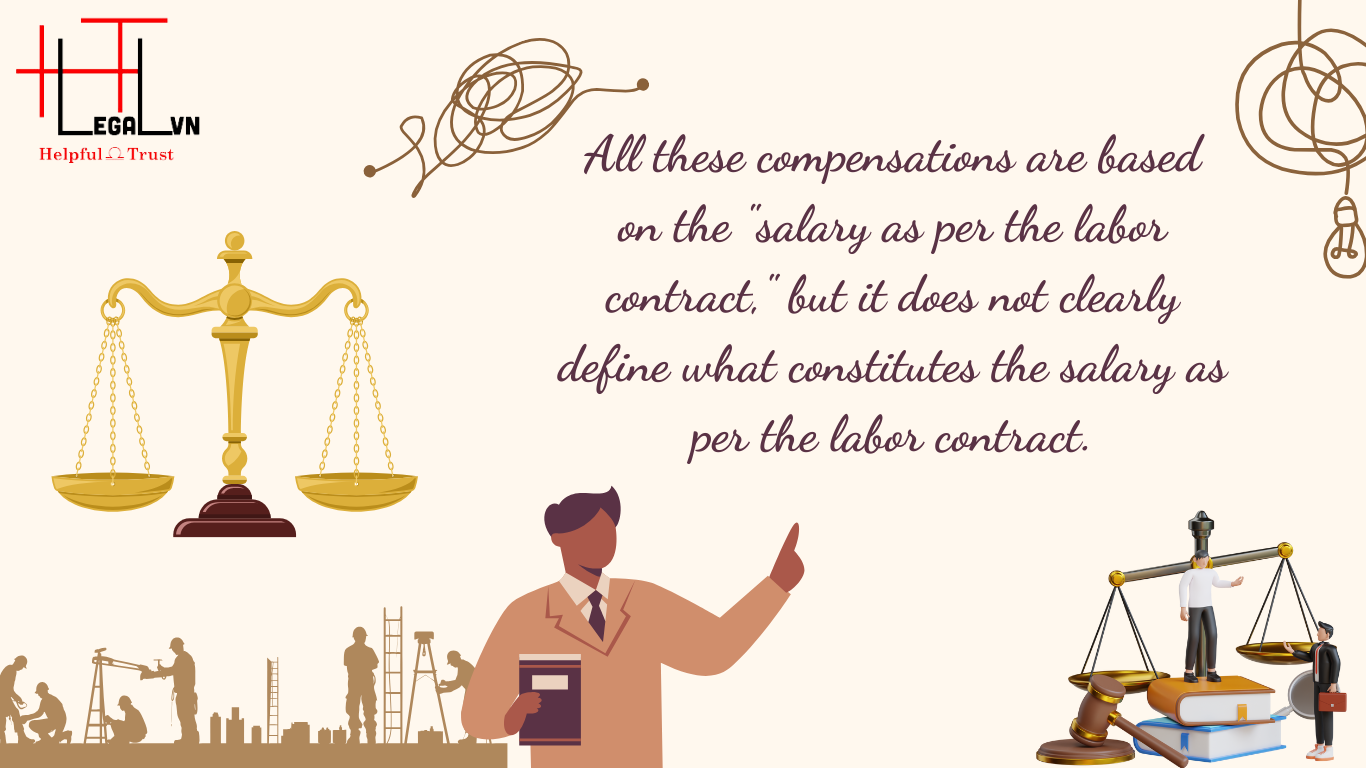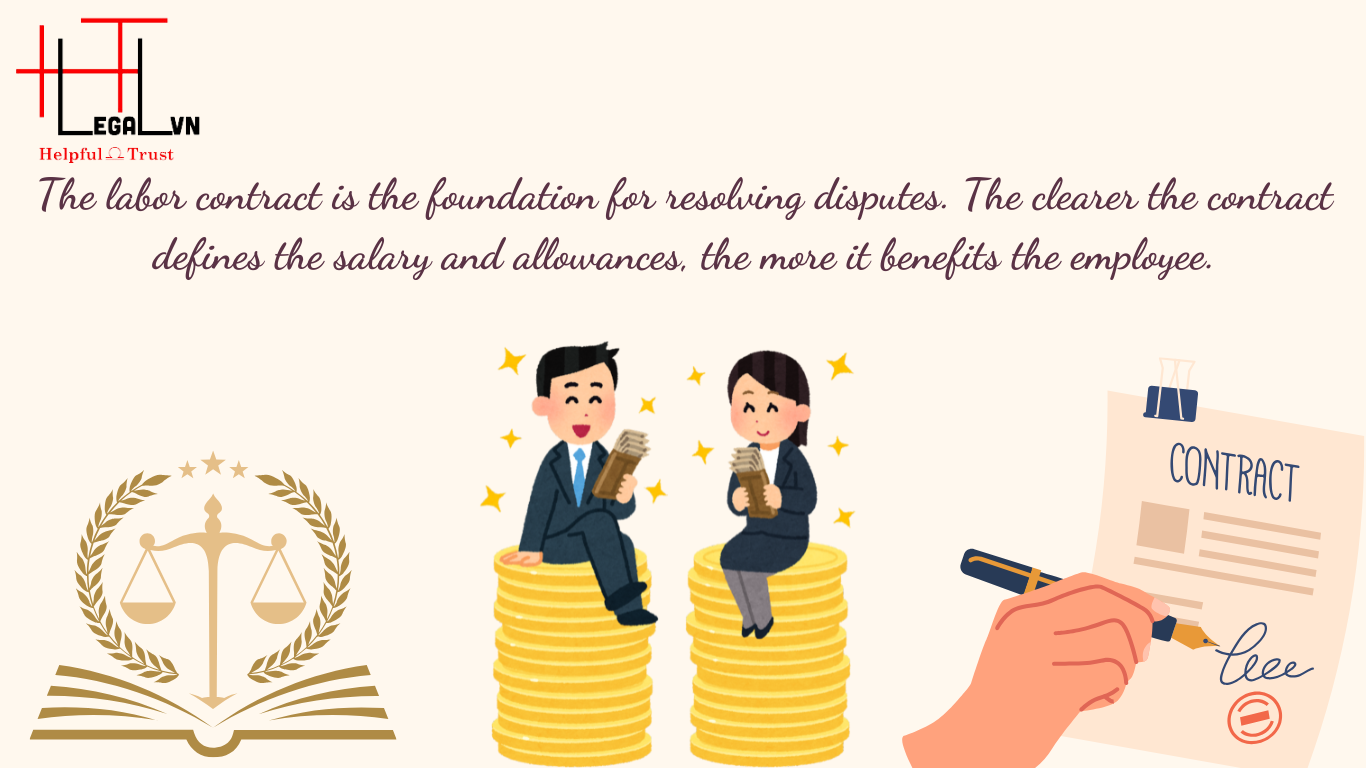WHAT IS THE SALARY LEVEL FOR CALCULATING COMPENSATION WHEN UNILATERALLY TERMINATING THE LABOR CONTRACT UNLAWFULLY?
(REPUTABLE LAW FIRM IN HO CHI MINH CITY)
Legal situation
The employee has a dispute with the employer, and the first-instance court has determined that the employer unlawfully unilaterally terminated the labor contract. The court applied the basic salary according to the labor contract to calculate compensation. Meanwhile, the actual salary includes various components: basic salary, job allowances, living support, business bonuses, attendance bonuses, transportation and phone allowances, etc.
The employee disagreed with the judgment and appealed, and the appellate court agreed to calculate compensation using the actual salary.
So, what is the basis salary for resolving compensation claims when the employer unilaterally terminates the labor contract illegally: the basic salary stated in the contract or the actual salary received?

The following article by HT Legal VN Law firm will share with our clients some legal provisions and judicial practices related to this issue.
Currently, the actual salary received by employees is often higher than the salary stated in the labor contract. This situation is quite common partly due to allowances, subsidies, bonuses, commissions, etc., which are not shown in the labor contract, and partly to reduce the amount of social insurance contributions. As a result, the parties often agree on an additional amount beyond the basic salary stipulated in the labor contract.
1. Legal Provisions:
According to the provisions of Article 41 of the 2019 Labor Code, the law does not specify which salary level is used as the basis for compensation when the employer unilaterally terminates the labor contract illegally. Instead, it lists the compensations the employer must pay as follows:
- The salary for the days the employee is not allowed to work and an additional amount equal to at least two months' salary as per the labor contract.
- In case of violating the notice period regulations, the employer must pay an amount corresponding to the salary as per the labor contract for the days without notice.
- If the employer does not want to reinstate the employee and the employee agrees, apart from the above amount and severance pay, both parties can agree on additional compensation for the employee, but it must be at least two months' salary as per the labor contract to terminate the contract.
- Other insurance and allowances.
All these compensations are based on the "salary as per the labor contract," but it does not clearly define what constitutes the salary as per the labor contract.

2. Practical Application:
Based on practical participation in labor cases and studying labor court judgments, HT Legal VN's lawyers share the following approaches to resolve such issues:
- The case where the employee and employer have agreed on the salary:
Usually, when there is a labor dispute between the employer and the employee but no dispute over the salary amount used as the basis for compensation, the court will apply the agreed salary, whether it is the basic salary or the actual received salary, as long as it matches the documents and evidence provided by both parties.
- When the employee and employer cannot agree on the salary basis for compensation:
Causes
Lack of Agreement on Salary: Sometimes, the employee cannot provide the labor contract, or the salary basis proposed by the employee for compensation is not accepted by the employer. Additionally, the employee may not provide evidence to determine their salary, or both parties may not agree on the salary even if allowances are clearly stated in the contract. This makes it challenging for the court to determine the salary basis for compensation.
In scenarios like the one mentioned, the employee wants compensation based on their actual received salary (including allowances), but the employer only agrees to compensate based on the basic salary, which is the salary used for social insurance contributions.

Legal Considerations
No Specific Legal Provisions: Currently, there are no clear legal provisions on which salary level to use for compensation. Therefore, the salary considered for compensation depends on the labor contract and the perspectives of the courts during trials.
+ Labor Contract as the Basis:
The labor contract is the foundation for resolving disputes. The clearer the contract defines the salary and allowances, the more it benefits the employee.
-
(1) If the labor contract or its annex clearly states the salary and allowances, then the company’s agreement to only pay the basic salary is against the law’s provisions on “salary as per the labor contract” (Article 41 of the 2019 Labor Code) and Article 90, which defines salary as including job-based salary, allowances, and other supplements.
-
(2) If the labor contract only states the basic salary and other allowances are agreed upon separately, it’s difficult to make claims since the court relies on evidence provided by both parties. However, the employee can use bank transfer slips, salary statements, etc., to prove the allowances received during their employment.
+ Court Perspectives
Since this issue is not clearly regulated, there are two court perspectives based on labor case participation and judgments analyzed by HT Legal VN's lawyers:
(1) Only Basic Salary as Compensation Basis
This perspective is applied when the employee cannot provide clear evidence of received allowances, or the court considers allowances like living expenses, fuel, phone, etc., as only payable for actual work done. When not working, the compensation is based on the basic salary/social insurance contribution salary.
Not to mention, applying the actual received salary raises the legal issue of whether the agreed-upon incomes, salaries, and bonuses are indeed lawful and compliant with legal regulations. Therefore, this perspective is more commonly applied.
Examples of Cases:
- Judgment No. 31/2024/LĐ-ST dated 03/05/2024 by the People’s Court of District 12, Ho Chi Minh City on “Unilateral Termination of Labor Contract”.
- Judgment No. 04/2023/LĐ-PT dated 17/11/2023 by the People’s Court of Ca Mau Province on “Dispute over Unilateral Termination of Labor Contract”.
(2) However, there are also some judgments where the court applies the actual received salary (including allowances and supplements) as the basis for compensation.
For example Judgment No. 03/2024/LĐ-PT dated August 15, 2024, by the People's Court of Tay Ninh Province on "Unilateral Termination of Labor Contract".

3. Draft case law on the salary level applied as the basis for compensation when the employer unilaterally terminates the labor contract illegally.
Due to different interpretations of the salary level applied for compensation, in Draft Case Law No. 21, Case Law No. …/2024/AL, proposed by the Department of Legal Affairs and Scientific Management of the Supreme People’s Court, concerning determining the salary level as the basis for compensation for employees, aims to guide the uniform application of the law in similar situations:
“In cases where the employee and the employer cannot agree on the salary the employee is entitled to, the Court shall base the compensation on the salary level that the employer has paid social insurance for the employee if the employer unilaterally terminates the contract illegally.”
However, this is only a draft and has not yet been used as official case law, so it is for reference purposes only and has not been officially applied in litigation.
Conclusion:
Currently, the salary used as a basis for compensation when the employer unilaterally terminates the labor contract illegally is based on the labor contract between the employee and the employer, the documents, evidence, arguments during the trial process, and finally, the viewpoint of the courts in considering and determining an appropriate salary in each specific dispute.
Therefore, in our opinion, employees who want to protect their rights should sign labor contracts or appendices that clearly specify the allowances they are entitled to so that in case a dispute occurs, they have a basis to protect their rights. Even if the employee actually receives a higher amount, but this agreement is not reflected in the contract, the court cannot require the employer to compensate the employee.
We are pleased to welcome customers at the following addresses:
Lawyer Nguyen Thanh Trung or HT Legal VN Law Firm
Office 1: 37/12 Alley 602 Dien Bien Phu, Ward 22, Binh Thanh District, Ho Chi Minh City (Next to Ward 22 People’s Committee)
Office 2: 207B Nguyen Phuc Chu, Ward 15, Tan Binh District, Ho Chi Minh City
Office 3: No. 5, Alley 252/115, Tay Son Street, Trung Liet Ward, Dong Da District, Hanoi
Email: info@htlegalvn.com Hotline: 09 6161 4040 – 09 4517 4040
.png?ver=1738828264)









